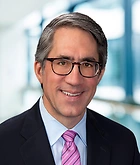Q&A With Vorys’ Scott Ziance
This article originally appeared in the Spring 2024 edition of Development Incentives Quarterly.
One of the regular features of Development Incentives Quarterly is an interview with an industry leader. For this edition, we are keeping that close to home with an interview of Scott Ziance, the founder and leader of the Vorys international economic development incentives practice and the board chair for Vista Site Selection, LLC, an ancillary business of the law firm launched in late 2022. Scott graduated from Bowling Green State University in 1993 and from Harvard Law School in 1997, and he has been at the law firm since September 1997. This year, he and his wife, Carolynn, will celebrate their 30th wedding anniversary. They have two adult daughters, Cassie and Eleanor, and one mean Chihuahua, Parker.
How did you become interested in making a career out of economic development incentives?
The idea clicked during my third year of law school, when I enjoyed my state and local tax law class and my local government law class and decided to write my third-year paper on the topic. I was interested in economic development incentives before that, though. I remember following HUD Secretary Jack Kemp’s efforts to use economic development incentives to improve the lives of Americans. In addition, when I was on Bowling Green City Council (after beating the incumbent college professor who represented the ward that included most university students), I encountered incentives, which were used to attract and retain jobs in BG.
How has the practice changed over the years?
It has gradually become more complex and, for the most part, more professional. For years, I think many of my colleagues thought all I did was ask the government for money for clients. Most now understand, however, that to be a strong incentives practitioner, one must have a decent understanding of various areas, including state and local tax law, public finance law, local government law, federal tax law, real estate law, commercial finance, government relations, the commercial real estate development process, etc. In addition, one must constantly adjust to changes in the law -- and state legislatures and Congress rarely make things less complex! Fortunately, the practice also has generally become more sophisticated. When I started, many state and local economic development professionals were simply well-connected back-slappers who stumbled into their jobs. Now, young people begin careers focused on economic development, and practitioners are generally much more experienced and knowledgeable than they were 25 years ago.
You’ve worked on huge projects in about half of the states and internationally. What project are you most proud of?
It’s not any project I’m most proud of, but rather, I’m most proud of the teams we’ve been able to build and the lifelong relationships we’ve established while doing great work for our clients. We now have seven excellent attorneys who spend the majority of their time on state and local economic development incentives matters throughout the country and, more recently, internationally. We also have an experienced, full-time economic development manager, and the Vista team has four amazing professionals in Texas, Florida and Ohio. I really like the fact that all three “of counsel” members of our incentives team are attorneys who sat across the table from us negotiating complex incentives agreements; we showed that we can zealously advocate for our respective clients while proceeding professionally and earning opposing counsel’s respect. Finally, we are blessed to be in a profession in which there are an abundance of nice people. I consider so many of the people for whom we work, with whom we negotiate, and even with whom we compete, to be friends, and I hope they feel the same way.
Finally, do you have any tips for budding economic development incentives practitioners?
Our teams know that I could spend 30 minutes on this one, but I’ll limit my answer to three tips. First, read the applicable statutes. Even though the practice has become more professional, I continue to be amazed at how relatively few people actually read the applicable laws. Website synopses are frequently outdated and are simply no substitute for what the laws actually say. Second, spend time in the “not urgent, but important,” quadrant, and if you don’t know what I’m talking about, read The Seven Habits of Highly Successful People. Third, be extremely responsive. This third tip applies to any profession, and especially to our profession, in which lack of responsiveness may mean that you will lose opportunities you never knew you could have had.

